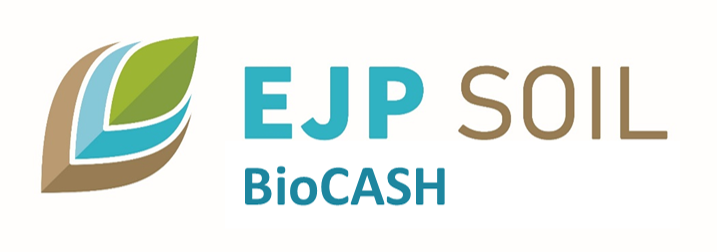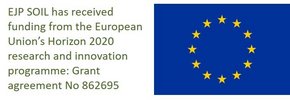BioCASH
| Start: | 1 November 2022 |
| Duration: | 24 Months |
| Aim: | Bio-economy and Circular Agriculture for Soil Health |
| Keywords: | Bio-economy, circular agriculture, sustainability, agricultural production systems, soils |
| Contact: | Coordinator: John Helmig (john.helming@wur.nl) (Wageningen Research, WR) |

The key research question guiding BioCASH is how resource management can be optimized to close nutrient, energy and biomass circles which integrate urban composts and green wastes in multi-purpose agro-ecological production systems that is economically viable, socially acceptable and long-term sustainable beyond the agricultural sector.
Soil health is here an important criterion for assessing sustainability. To address this research question, BioCASH aims at creating a modelling framework at micro level that enable scaling up of biocircular supply chains of waste streams from the level of selected and site specific production systems to landscape level.
From the soil perspective, the toolbox should consider the evaluation of indicators related to soil health (e.g. soil biodiversity, carbon sequestration, capacity of water retention, nutrient cycling) and safety (i.e. analysis of contaminants such as metals and microplastics).
From the agronomic perspective, the toolbox should also translate the results on soil functions into soil fertility and the outcomes on plant growth. From the circularity perspective, cost benefit analysis and environmental footprint analysis of biocircular supply chains of waste streams should also be seen as model components in the toolbox.
The combined use of existing modelling frameworks at macro level and the proposed modelling framework at micro level should be able to capture policies and drivers of large scale structural changes on bioeconomy as well as agricultural transitions, and their consequential effects on soils functions.
Objectives
-
Develop a conceptual framework for selecting promising (existing and emerging) bio circular supply chains of waste streams, identifying ongoing policies and actions plans made to promote the use of organic amendments on soils, identify key data and modelling gaps to be targeted by the modelling toolbox;
-
Create a structured database containing economic and local contextual factors (e.g. soil structure, waste source, geographical location, policy scope, pedo-climatic conditions) of case studies on the use of organic amendments derived from waste streams, which enable a comprehension on the upscaling potential;
-
Design and development of a cross-scale modelling toolbox for assessing waste streams supply chains, the application of organic amendments on 14 agricultural soils and their impacts on different soil functions and agro-ecological production systems;
-
Evaluate the robustness of the toolbox under a framework of policies that promote agro-ecological transition towards a more circular and climate resilient agriculture systems.
Project Workflow
WP1 - Conceptual framework for selecting biocircular waste stream supply chains
WP1 will build a conceptual framework of analysis guiding the entire project in regards to data requirements (WP2), design and evaluation (WP3) and scenario analysis and policy recommendations (WP4). It is composed of three main tasks, of which the first and second tasks refer to a) a desk research of scientific and grey literature including EU circular agriculture and bioeconomy projects and b) a survey among national EJP-SOIL members on existing and emerging initiatives of biocircular supply chains of waste streams (hereafter named as biocircular waste streams) with potential application in agricultural soils. A Final task will consider knowledge and modelling gaps and modelling needs. Based on the three tasks in WP1 the most promising (for wider/potential implementation in Europe) and feasible (research perspective) biocircular waste streams options will be identified for further in-depth assessment in the forthcoming WPs.
WP2 - Creation of a structured database that enables an integrated assessment of biocircular waste stream supply chains at landscape level
WP2 will build a structured database around the most promising biocircular waste streams options selected in WP1 in order to enable analysis at landscape level. In short, the structured database should collect information on the contextual factors (e.g. pedo-climatic, agronomic, techno-economic, environmental, policy framework) of the selected biocircular waste streams options. The structured database allows understanding the scalability of the biocircular waste streams beyond local scale. The target users of the database should be able to have a better comprehension on the implementation potential of the biocircular waste streams in Europe.
WP3 - Development of a cross-scale integrated modelling toolbox to assess soil functions
WP3 will comprise a modelling toolbox (proof of concept) designed to integrate inputs and outputs obtained from analysis at lab scale and soil/agronomic functions at landscape level. It will comprise assessment of soil samples and bio-based materials in soil labs, which will provide data inputs for modelling and integrated assessment of biocircular waste streams at landscape level and at the level of agricultural production systems. This feedback across scales is key for decision making in bio-circular agriculture (from local agents to regional policy makers) and should be flexible to add new model components and data to increase its robustness. These data will also form the basis of life cycle analysis studies. The life cycle analysis will allow for the transparent presentation, comparison and evaluation of the environmental impacts of inputs and outputs for all scenarios.
WP4 - Evaluation protocol for the production systems and policy evaluation
WP4 will assess the contribution of different policies in stimulating adaptations of existing production systems to more circular agriculture practices and development of new production systems. Current resource management practices and policies will be assessed and ranked from least to most sustainable in light of the agro-ecological transitions. New policy instruments that foster transitions and development of sustainable production and land management systems will be proposed in case needed. The policy assessments will be supported by the updated integrated modelling framework across different scales (micro-macro and landscape levels), including LCA techniques.
WP5 - Project management and communicaton
WP5 will carry out the project management and communication, ensuring the coordination of project activities internally within the consortium and that the findings of the project are effectively communicated towards the key end-users of the project, including farmers and policy makers at national and European level. WP5 also ensures that the perspectives of these stakeholder groups are reflected in the analysis carried out throughout the project. These activities will also contribute to building a long-term network during and after the project.
Consortium

Wageningen Research (WR)
Main contact: John Helming
Stichting Wageningen Research (WR) consists of 5 specialized and leading institutes for applied research in the domain of healthy food and living environment. WR offers a combination of practical, innovative and interdisciplinary scientific research across many disciplines related to sustainable use of our living environment. Teams of Wageningen Environmental Research (WEnR) and Wageningen Economic Research (WEcR) involved in the consortium are specialized in agro-ecosystems, soil research and climate change mitigation related to agricultural production and to ecosystem services including carbon sequestration and carbon farming. WR delivers a range of perspectives to the needs of the research community, policymakers, academia, industry, farmers, government and the society.

Instituut voor Landbouw, Visserij en Voedingsonderzoek (EV-ILVO)
Main contact: Bart Vandecasteele
ILVO is involved in activities on biochar-based fertilizers and cascading use of biochar and biomass. The objective of this activity is to assess the characteristics and the added value as renewable fertilizer of combinations of biochar with products of waste treatment processes. Biochar is a source of stable C but its agronomic value can be increased by combining it with other biomass and sources of nutrients. The link between soil management and the soil microbiome is assessed for 5 field trials in Northern Belgium with different strategies on soil management. For these field trials the top soil has been characterized both chemically and biologically. ILVO is also involved in assessing existing and new bio-economy policy instruments.

Norwegian Institute of Bioeconomy Research (NIBIO)
The Institute aims to contribute to food security, sustainable resource management, innovation, and value creation through research and knowledge production within food, forestry, and other biobased industries. NIBIO delivers research, managerial support, and knowledge for use in national preparedness, as well as for businesses and society. Approximately 700 employees are present in all parts of the country. The main office is located at Ås in Akershus, just outside Oslo.

Spanish National Research Council (CSIC)
Main contact: Antonio Martín-Esteban
The National Institute for Agricultural and Food Research and Technology (INIA), a National Center integrated into the Spanish National Research Council (CSIC), is a reference institution in agri-food and forestry science and technology at national and international level, whose objective is to support sustainable economic growth and the well-being of society through agricultural and food research and innovation. Besides, one of the most important objectives of the INIA-CSIC is to maintain and reinforce its role as coordinator of agricultural, food and forestry research at an international level and with special incidence in Ibero-American countries.

Swedish University of Agricultural Sciences (SLU)
Main contact: Anke Hermann
SLU conducts research, environmental monitoring & assessment (EMA) and higher education for sustainable soil management in agriculture, forestry and urban environments. The current EMA program consists of twelve programmes, including the Agricultural Landscapes program. This program delivers data to evaluate the Swedish environmental objectives and to inform national and international agricultural policies. Furthermore, SLU manages 4 field research stations and more than 50 agricultural long-term field experiments across the country, investigating effects of agricultural management inter alia on crop fertility and yield. Within the BioCash project, SLU will contribute with expertise on nutrient recirculation in agricultural soils.

